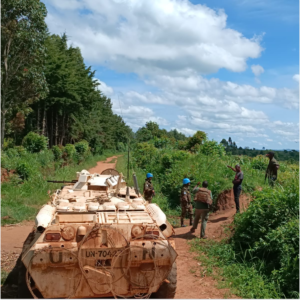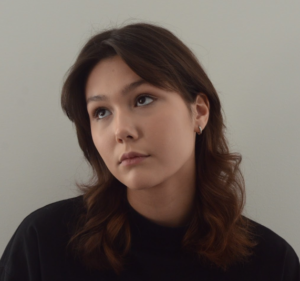17 year-old Sofiya Suleimenova breaks down the escalating tensions in the DRC

May 4, 2022. MONUSCO Bangladeshi peacekeepers in the DRC. Despite heavy fighting, MONUSCO began withdrawal from the Democratic Republic of the Kongo.
December 1, 2023
A ‘silent genocide’ in DRC is impacting millions of lives
In the heart of Africa, the Democratic Republic of Congo (DRC) stands as a nation marred by a history of conflict and a tapestry of complexity.
Described as ‘the silent genocide’, an ongoing conflict in the eastern region has cast a spotlight on the escalating tensions that threaten to further undermine the fragile stability of the state.
The DRC, which has the largest population of internally displaced persons in Africa, is facing ‘one of the world’s longest and most complex humanitarian crises’. The independent US agency, US AID said this has been driven by ‘decades of conflict and insecurity’.
According to a briefing on November 24 by a UNHCR spokesperson in Palais des Nations, Geneva, in the last six weeks, the violent clashes forcibly displaced more than 450,000 people in Rutshuru and Masisi territories in North Kivu Province. While approximately 200,000 internally displaced people are currently stranded without access to humanitarian aid.
Who is behind the escalating tensions?
The two major groups in the conflict are the March 23 Movement (M23) armed group and the Congolese armed forces (FARDC). But, the involvement of other armed groups, such as CODECO and Zaire groups fighting over control of Ituri’s gold mines has further added to the violence.
The M23 was created by a group of officers after failed negotiations took place on March 23, 2009, between Kinshasa and the National Congress for the Defence of the People (CNDP) under the leadership of a former Rwandan Patriotic Front (RPF) militant, Laurent Nkunda, which enabled CNDP’s integration into the DRC’s military.
M23 further claims to defend the interests of Congolese Tutsi and Kinyarwanda-speaking minorities from the threats of Hutu militias and due to the state’s inability to protect them.
A ceasefire between the M23 and FARDC was declared on March 7, 2023, which was meant to facilitate the withdrawal of M23 from territory it occupied in Masisi and Rutshuru and to ensure a dialogue with the DRC’s government.
This process proved to be ineffective, with violence resurging.
The UN reports that DRC’s crisis impacted the country’s relationship with Rwanda due to “sporadic clashes between both countries’ security forces in the border area and accusations of Rwanda’s military and logistical support for the offensive of the armed group M23”.
Migrants’ Rights Network, a London-based NGO, labelled the conflict in the DRC as one of the ‘silent genocides’ currently unfolding in the world, with ‘too little attention’ being paid to it, alongside Sudan and Armenia.
It along with others claims the crisis is rooted in colonialist ambitions due to Western powers’ involvement in the conflict. DRC, especially the eastern region, is high in resources.
Read more:
‘We stand in solidarity with the people of Armenia, Congo and Sudan’
The Migrants Rights’ Network justifies its accusations by giving the following account:
“Today, Congolese civilians are being massacred by the Rwanda-backed M23 rebels, as part of a long history of Western and corporate intervention in the DRC.
Western corporations profit from the mining of coltan, cobalt, gold, diamond and other minerals in the DRC, whilst the West (the UK, US and France) has been providing military funding to both Rwandan and Ugandan militias in Congo.
The UK has also remained silent on Rwanda’s role in the violence, which is unsurprising given the Rwanda deportation deal.”
Who is affected?
As of October 2023, around 7 million people have been internally displaced due to the intensification of the conflict. Since the beginning of the year up to November 17, more than 770 civilians have been killed across the province.
“This humanitarian crisis remains one of the most neglected in the world,” said Ms. Keita, Head of the UN Mission in the DRC (MONUSCO) and Special Representative of the Secretary-General for the DRC.
“The displaced populations, which I visited, live in extremely precarious conditions,” she added.
The political instability in DRC has led to increased vulnerability among the population, further undermining human rights.
The displaced populations include a large proportion of children. They are residing in overcrowded internally displaced person (IDP) sites in and around Goma, the capital of North Kivu, and the surrounding Nyiragongo Territory.
According to relief actors, these people are still in urgent need of food, health care, protection, shelter, water, sanitation, and hygiene among other necessities.
International children’s charity Save The Children reported that over 26 million people, including 14.5 million children, are in urgent need of food aid.
Many of the people affected by the conflict remain at high risk of protection violations, such as arbitrary arrest, abduction, forced labour, and gender-based violence.
Ms Keita pointed out that more than 10,000 survivors of gender-based and sexual violence sought assistance from the UN peacekeeping mission, MONUSCO, in the three provinces in June and July.
MONUSCO Withdrawal
As of November 22, the United Nations Organization Stabilization Mission in the Democratic Republic of the Congo (MONUSCO) will gradually withdraw from DRC under the President of DRC, Félix Tshisekedi’s request.
Ms Keita said 2022 was one of the deadliest years on record for MONUSCO peacekeepers, who operate in an “increasingly complex, volatile and dangerous” environment.
She also highlighted the hard work and effort put in by the mission into protecting civilians, disarmament and demobilisation of armed groups in the region.
The UN highlights in its briefing that even after its departure it will “continue to support the development efforts of the Congolese government and people, with the aim of sustaining peacebuilding and security gains in the country.”
Elections in December – what do they mean?
Elections are planned to be held on December 20 this year. Ensuring that elections will be held contributes to the protection of democracy in the country.
This determination of the Congolese authorities and the Independent National Electoral Commission (CENI) has been praised by the UN envoy.
Ms Keita pointed out the challenges facing DRC in the electoral process. Stating that DRC’s violent clashes constitute “serious obstacles to voter registration work,” and the electoral process itself has been marked by “a worrying lack of trust between the main stakeholders of civil society and the opposition.”
However, she added how “the recruitment of 13,000 police officers ahead of the 2023 elections should help extend state authority and strengthen the rule of law.”




